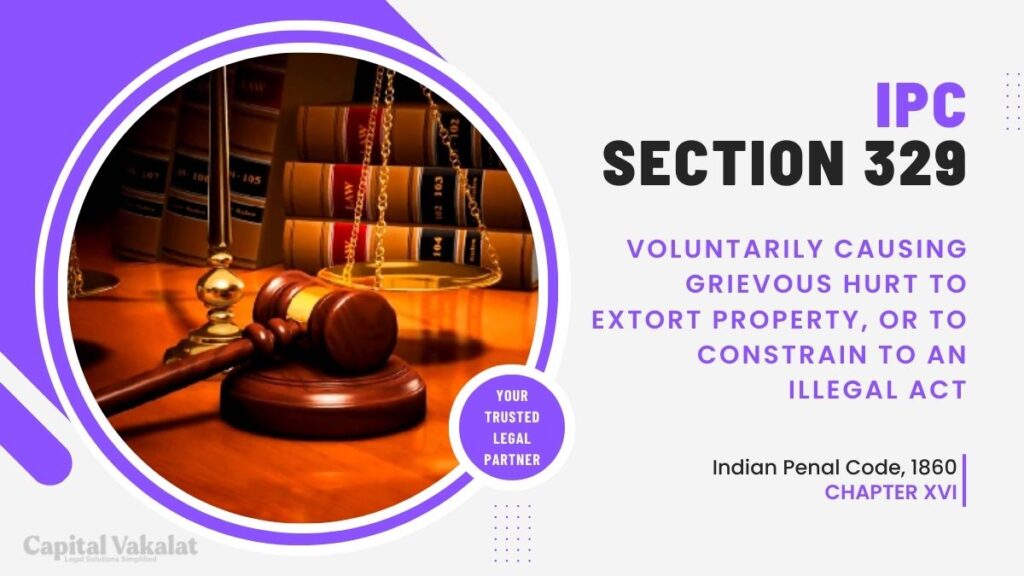Section 329 of the Indian Penal Code (IPC) deals with a serious offense – voluntarily causing grievous hurt to extort property or to constrain to an illegal act.

It is crucial to comprehend the implications of this legal provision to appreciate its significance in the realm of criminal law.
Understanding Voluntarily Causing Grievous Hurt
In legal terms, grievous hurt refers to a severe injury or harm that endangers life, causes permanent disfigurement, or impairs the functioning of any organ. Section 329 IPC focuses on situations where such harm is intentionally inflicted, shedding light on the elements that constitute the offense.
Extortion and Section 329 IPC
The connection between voluntarily causing grievous hurt and extortion is a key aspect of Section 329 IPC. This section addresses instances where individuals resort to causing severe harm to extract property from others unlawfully. Exploring this link provides insights into the severity of the offense and the legal consequences for those involved.
Constraints to Illegal Acts
Apart from extortion, Section 329 IPC also encompasses cases where grievous hurt is employed to constrain someone to commit an illegal act. This introduces a dimension of coercion and explores scenarios where physical harm is used as a means to force individuals into unlawful activities.
Historical Context
To truly understand the implications of Section 329 IPC, it is essential to delve into its historical context. This includes tracing its origins and evolution over time, as well as examining key legal cases that have shaped the interpretation of this provision.
Penalties and Punishments
A critical aspect of Section 329 IPC is the severity of penalties associated with the offense. This section explores the judicial approach to sentencing in cases involving voluntarily causing grievous hurt for extortion or to constrain to an illegal act, emphasizing the gravity of such actions in the eyes of the law.
Challenges in Prosecution
Prosecuting offenses under Section 329 IPC comes with its set of challenges. This section highlights the difficulties faced by the prosecution in proving the offense and explores common legal defenses employed by the accused in such cases.
Case Studies
Real-world examples of cases involving Section 329 IPC provide practical insights into the application of this legal provision. Examining these cases not only illustrates the diverse scenarios in which the offense can occur but also offers valuable lessons for legal practitioners and the general public.
Relevance in Contemporary Society
As society evolves, so do the challenges faced by the legal system. This section discusses the contemporary relevance of Section 329 IPC, considering its impact on current legal and social issues. Understanding this relevance is crucial for ensuring that the law continues to serve its intended purpose in modern times.
Conclusion
In conclusion, Section 329 IPC plays a vital role in addressing offenses related to voluntarily causing grievous hurt for extortion or to constrain to an illegal act. The multifaceted nature of this provision underscores the importance of its awareness and understanding within the legal framework.
Frequently Asked Questions
What defenses can be used against charges under Section 329 IPC?
Legal defenses may include lack of intent, self-defense, or challenging the evidence presented. Each case is unique, and defenses depend on the specific circumstances.
How has the interpretation of Section 329 IPC evolved over time?
The interpretation of Section 329 IPC has evolved through landmark legal cases, reflecting changing societal norms and legal perspectives.
What penalties can one face if convicted under Section 329 IPC?
Penalties for offenses under Section 329 IPC can include imprisonment and fines, the severity of which depends on the specific circumstances of the case.
Is Section 329 IPC applicable only to physical harm, or does it cover other forms of harm?
While Section 329 IPC primarily addresses physical harm, the legal system may consider other forms of harm in the context of constraining to an illegal act or extortion.